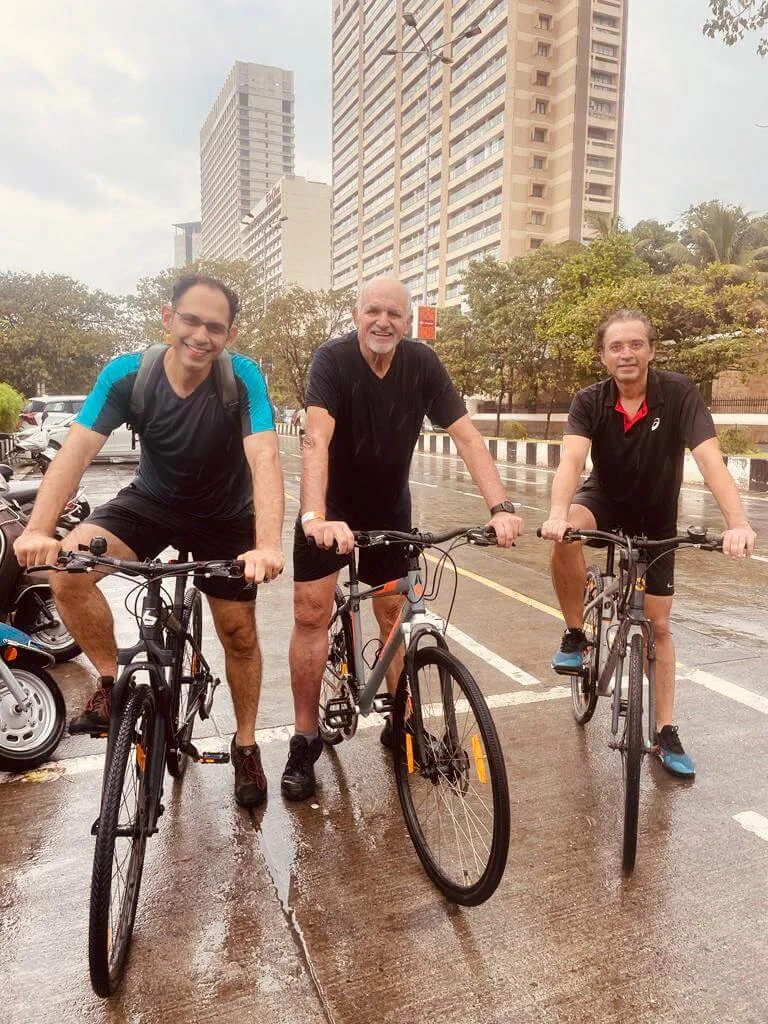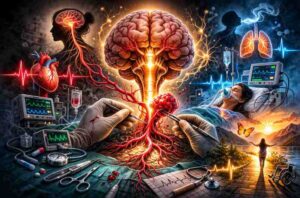A patient travels across the ocean to treat his cancer and get drenched in Mumbai’s first showers

“Hey, Bruce!” I exclaimed with surprise, a big smile on my face as I bumped into him in the hospital corridor during my rounds. At 6 feet 2 inches, he was hard to miss. He had a square frame upon which his broad shoulders rested. His brown French beard made its presence felt over his fair complexion. Even though he had a tough exterior, he had the kind of face that if you saw the first thing in the morning, your day went well.
“It’s so lovely to see you, buddy,” I said to all of his 72 years and all of his 72 hairs. He had been born in Zimbabwe, and after having lived on a few continents in his younger years, he had decided to settle down in a quaint town in southern Africa. “What brings you back to us?” I enquired. My orthopaedic colleague Dr. Mudit Khanna had done a knee replacement on him a few years ago with such astounding success that from not being able to walk a few steps he was cycling 30 km every day. I knew him well because when Mudit and I went to his country on a work visit, he took us both for a 4-hour cycle ride in the bush where lions roared not very far from us.
“I’ve been diagnosed with prostate cancer,” he said matter-of-factly, “and this is where I have faith, so that’s why I’m here.” Trust and conviction are so crucial in healing I thought to myself. As one of the greatest physicians of the 20th century, Sir William Osler, said, “Nothing in life is more wonderful than faith – the one great moving force which we can neither weigh in the balance nor test in the crucible.” “The urologist will do a biopsy and then plan ahead,” Bruce added, convinced he was going to be cured. “But before I start any treatment, I have a request. Let’s go for a bicycle ride around the city,” he said, clearly reminiscing the wonderful time we had had together. “Deal,” I confirmed, as we shook hands.
So at 6 AM on the following Sunday, Mudit and I picked up Bruce from the hospital. It was the first weekend that the city had been blessed with the onset of the monsoon. The three of us rode along wet Mumbai roads glistening from their first wash in the rain. The crisp air and cool breeze made the climb up Pedder Road seem like a walk in the park, and for Bruce the veteran, it was more of a saunter. We had decided to give him a cycle tour of the city, and as we rode past Marine Drive, we saw a bunch of overjoyed Gujrati adults indulging in garba, circling a loudspeaker in the pouring rain at 7 in the morning. Our day was made.

We rode past pigeons flying off near the Gateway of India and took pictures with the iconic Taj Mahal hotel as our backdrop. The skyline of the city looked so beautiful as raindrops peltered the Arabian sea. “This is such a great way to see the city,” Bruce was thrilled. “You get to see it from such a different vantage point – not too fast, not too slow,” he pondered completely soaked in the rain. After encircling 20 km of south Mumbai, we stopped at Cafe Mondegar for breakfast, and Mudit ordered a couple of beers for breakfast – because that’s what orthopaedics do. We fed Bruce some kheema pav to tickle his tastebuds; little did we realise that as an African, he had tasted the meat of nearly every conceivable animal. “Are you allowed to drink and ride in this city?” he asked. “As long as you don’t hit a bump and spill the drink, it’s fine!” I joked. We rode back via Kala Ghoda, Flora fountain, and CST station as the pelting rain stung us with pleasure in the face. It was an invigorating 40 km ride and an excellent start to the day.
Medical tourism is the practice of travelling across international borders to seek healthcare services. It was once a liberty of the rich, who travelled to the hot springs of distant Mediterranean countries to soak themselves in mineral rich water that had healing properties, or those who travelled from underdeveloped countries to developed ones for medical aid. Today, it is a common and an affordable affair for people in developed countries who are not that well-off to travel to developing nations offering the same medical care at reasonable prices and comparable expertise.
Every individual wants optimal healthcare for themselves and their families. Oftentimes, however, the care that one is seeking is not available within short distances. Occasionally, even when care is available, one might not be able to avail of it within the desired timeframe. The wait list for a knee replacement in countries like Canada and the United Kingdom, which follow a socialist practice of medicine, is over a year. In India, you could book a knee replacement as fast as you could get a burger from a drive-through at McDonald’s. And unlike McDonald’s, at some places, when you go in for a knee replacement, you can get the other one at half price.
Sometimes, the financial implications in the patient’s home country may be prohibitive. An uninsured US citizen was once treated at our hospital by me for a complex multi-level spinal fusion surgery that was to cost her USD 100,000 in her country. She had the same operation done by us here for one-tenth the cost and was so happy that she flew back business class! There is also a certain special doctor–patient relationship that develops when patients travel long distances to see a physician or surgeon; friendships are made, bonds are established, and families are extended. Metaphorically, not literally.
According to sources, India ranks at number 7 among the 20 wellness tourism markets, with over 56 million trips made to India for medical value tourism that generated USD 16.3 billion in revenue. It also ranks at number 3 in wellness-focused countries in the Asia Pacific, with Thailand leading the race. That may be because we offer only a bicycle ride as an additional service to our tourists!
Over the course of the next 10 days, Bruce completed his treatment. He looked well and rejuvenated. He seemed happy to have made the choice to come back to us at Wockhardt. “My doctors have given me permission to ride my bike as much as I can,” he said with glee, clearly not letting the diagnosis of cancer interfere with his joy of living. “Hakuna matata,” I told him, as we fist-bumped each other.




